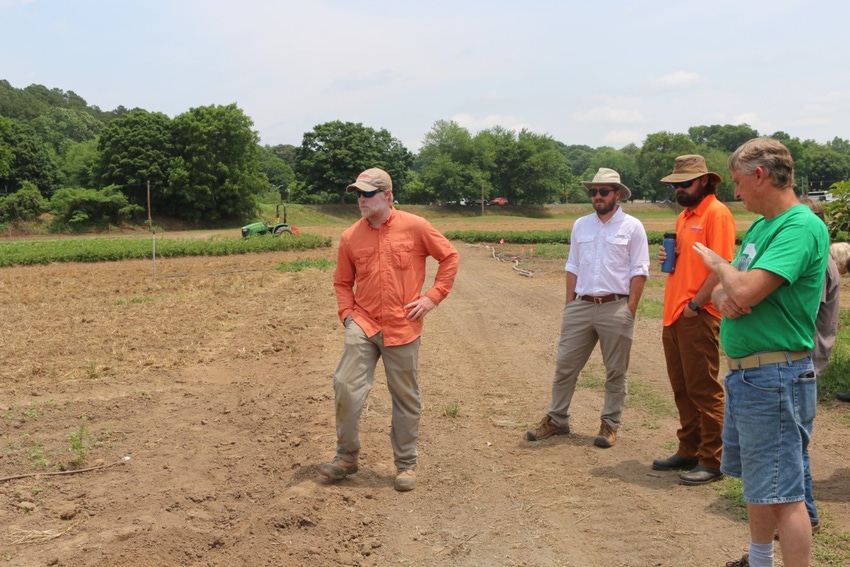
Know your farm. Know your crop. Know your weeds.
This advice comes from Matt Cutulle, assistant professor of vegetable weed science at Clemson’s Coastal Research and Education Center. Cutulle and other agricultural researchers described techniques for “integrated weed management” during a recent workshop at Clemson’s Madren Conference Center and Student Organic Farm.
Cutulle said weeds cause $32 billion in crop losses each year by battling crops for nutrients from the soil. Effective weed control starts when growers are mindful of the weed-free period, which is a critical point during the growing season when weeds cause the largest yield loss, he said.
“This period can vary greatly based on crop, how the crop is planted — seeded versus transplanted — as well as the type of weed that is present,” Cutulle said. “A conservative critical weed-free period would be six weeks, but, again, this can vary on crop and weed present.”
The critical weed-free period is a point during the growing season when it is critical for crops to stay weed-free for growers to maximize yield potentials. Once this critical period has passed, growers should focus on preventing weed seed production. Farmers can do this by causing the seeds to germinate and then killing them, or they can prevent germination and wait for the seeds to die or be eaten by seed-eating animals.
One technique is soil solarization, which involves using high temperatures produced by the sun to control soil-borne pests. This is done by covering soil with clear plastic tarps during a hot period of the year when the soil will be hit by direct sunlight for up to six weeks. The plastic tarps heat the top 12 to 18 inches of soil and kill a wide range of pests, including weeds, plant pathogens, nematodes and insects.
Soil solarization also can improve soil health by speeding up the breakdown of organic material and increasing the availability of nitrogen and other nutrients to growing plants and by beneficially altering soil microbiomes: bacteria and fungi that affect soil health and, ultimately, plant health.
Anaerobic soil disinfestation is a non-chemical alternative to using fumigants that can be used to control a wide range of soil-borne pathogens and nematodes. It is a three-step process that involves amending the soil with a carbon source to provide nutrients for beneficial soil microbes. Then the soil is irrigated to saturation and covered with plastic mulch for several weeks. During the disinfestation process, oxygen in the soil is depleted and toxic byproducts kill soil-borne pathogens.
This method is used effectively in the Netherlands and Japan.
Using cover crops and no-till are other methods of weed suppression.
Geoff Zehnder, director of Clemson’s Sustainable Agriculture Program, said using cover crops to suppress weeds early in the season can be beneficial, but termination is key.
“Vegetable growers often don’t grow cover crops because there are management challenges, including when is the best time to plant cover crops in order to get the most efficient amounts of biomass,” Zehnder said. “If you don’t plant at the correct times, you might not have enough biomass and, therefore, when you roll it down it won’t effectively suppress the weeds. Timing is critical.”
Cover crops offering the most success include crimson clover, winter rye, winter barley, spring barley, spring oats, buckwheat, foxtail millet, sunn hemp, black oats, hairy vetch, field peas and winter wheat.
Various mulches are on the market today for use in weed suppression. For information about controlling weeds by cultivating and mulching, read the Clemson Home and Garden Information Center’s Fact Sheet 1253 and/or HGIC Fact Sheet 1604.
Cutulle and others at Clemson’s Coastal REC, as well as researchers at the Clemson Student Organic Farm are studying additional weed-management strategies, including cryogenic weed control using liquid nitrogen to freeze exposed weed tissues before destroying the weeds and roller crimping cover crops.
Not all weeds are bad. Some weeds fill an ecological niche and are beneficial, according to Zehnder
“Farmers should learn about weeds – identification, biology and so on – so they can manage their farms to avoid weed problems in their crops,” he said.
Farmers and gardeners can identify weeds using Clemson’s Weed ID and Biology website created by Marcellus Washington, a lab technician at the Coastal REC.
Source: Clemson University, which is solely responsible for the information provided and is wholly owned by the source. Informa Business Media and all its subsidiaries are not responsible for any of the content contained in this information asset.
About the Author(s)
You May Also Like






